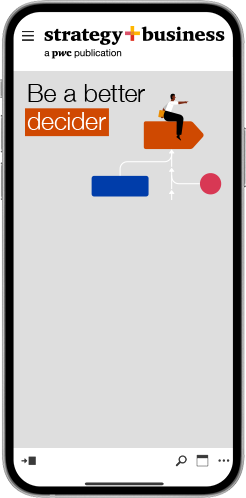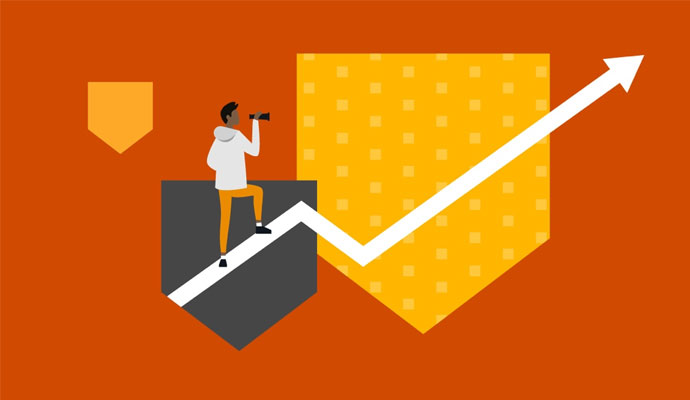Real-world solutions for unprecedented challenges
As leaders convene for the Global Solutions Summit in Berlin, businesses and governments face urgent global threats.
The World Business Council for Sustainable Development (WBCSD) was started almost three decades ago to galvanize the business community to adopt sustainable business practices. Today, the membership includes more than 200 organizations representing a combined revenue of more than US$8.5 trillion and 19 million employees. Ahead of the Global Solutions Summit 2022, which brings together thinkers, politicians, and business leaders from the G20 group of nations in Berlin at the end of March, strategy+business talked to WBCSD CEO Peter Bakker and Colm Kelly, PwC’s Global Leader for Corporate Sustainability, about the challenges for businesses and governments during this time of crisis.
S+B: Given what is going on in the world, what do you think is the biggest challenge facing us today?
Peter Bakker: If I had to summarize it as one challenge: the output of our economy, and therefore of our businesses, doesn’t support sustainability on the planet or in society. But from my point of view, there are three critical global challenges: the climate emergency, the loss of nature, and mounting inequality in the world. We need to keep our focus on that.
Colm Kelly: As you sit around the business leadership table, it feels like there are multiple, major, maybe even unprecedented challenges—not least, the most recent events in Europe. But I think Peter is exactly right. The broader systemic challenge we face is the need to ensure that the outcomes of business and economic activities are consistent with the sustainability of the planet, and consistent with delivering sustainable and supported outcomes for society.
And we should be very explicit. We have challenges that are urgent, and which have to stay on the right radar to be addressed. I would say that it’s not just in the interest of the planet and our society, as if that wasn’t enough. I think it’s clearly in the interests of individual businesses and of the collective business community. No business can survive and prosper in an environment where we don’t have sustainable outcomes for society and for the planet.
S+B: Peter, your organization has been working to bring businesses together for decades. How has the understanding of the challenges we face changed?
Bakker: When I joined in 2012, conversations were about: “Why do you want us to focus on sustainability?” Quite soon after I joined, the conversation moved to: “What is climate change?” We had heated debates amongst global businesses on why this is important. The conversation has completely changed now to: “How do you do big transformations?” How do you decarbonize your supply chain? How do you make your business nature positive? How do you contribute to a more equitable society?
Kelly: There are two related themes when it comes to business responding to the climate question. One is decarbonization. So, we’ve got increasing numbers of businesses recognizing that they need to decarbonize their operations and their supply chain, and they are setting net-zero targets to transform their business to achieve that. And that is no small task.
The other theme, which I would suggest in some respects will have more profound implications for business, is the “outside in” view: what are the impacts of climate risk factors, such as heat, humidity, and flooding, on businesses? Across a range of geographies—and this is included in the most recent IPCC [Intergovernmental Panel on Climate Change] report—you see the likelihood of very serious disruptions to operations and facilities, disruptions that could eliminate sourcing or supply capacity, or even customer markets.
If we don’t come to grips with this and make progress against it, it will drive social and political disruption. We have the very real possibility of mass migration. And, very recently, we have seen episodes of mass migration where people move to protect themselves and their families. No business can afford to ignore the strategic implications of these patterns. But I’m not sure how many yet really have done the analysis to understand the full implications of climate change and begun to respond, which, in turn, reinforces, if you’ll pardon the pun, the energy behind the efforts to decarbonize.
S+B: These scenarios seem beyond what business alone can address. Where do governments fit in?
Bakker: Business realizes that it cannot solve these big challenges on its own. Neither can we expect governments to do it for us. It really has to be co-creation. And in my mind, that has two aspects.
One centers around the process of the COPs [Conference of Parties], the annual climate meetings. Governments are now talking to each other about their nationally determined contributions (NDCs) to emissions reductions. But we know that more than 70% of global emissions are the result of business activities and that they are not measured as part of the NDCs. We need to create what we call the corporate determined contributions (CDCs) in a way that they can be added into the NDCs. That was a proposal we made at COP26 in Glasgow [in November 2021].
The second element is to standardize the disclosures that companies are asked to make so that we can see what targets companies set and the progress they’re making to deliver on those targets. At the end of the day, governments need to make these disclosures mandatory for all businesses. And that’s regulation that business is now asking for.
S+B: Colm, how are you seeing businesses respond to this?
Kelly: There’s a very significant shift in the business conversation around these topics. There is widespread support, for example, for reporting standards related to ESG [environmental, social, and governance] in general, and particularly climate. There is widespread demand from the investor community for transparency so that they can make proper investment and capital allocation decisions.
Peter is right. There’s also a recognition that running profitable, competitive businesses in a manner that is consistent with planetary sustainability and societal outcomes requires a policy shift. Business and government will need to work together to identify the range of policy measures necessary to make that happen. This goes beyond reporting and includes, for example, governance. That conversation is critically important to shift the system as a whole in the right direction.
Bakker: Three years ago, if you had said we need governments to be bold, people would have been a little bit more hesitant than I think they are today. They are coming out of a pandemic, where governments locked down economies, shut down businesses, sent people home, and completely changed the way of working. We have now the terrible war in Ukraine, which is displacing so many people. Who knows what energy policies may follow as a result of this? So, all of a sudden, we’re in an era where government is very much in the driver’s seat, having deep impact and putting business in a responsive mode.
Kelly: In many respects, the themes of this conversation reflect the concern about the decoupling of societal and business outcomes. It starts from the premise that market economies should serve the interests of driving prosperity for society. There’s lots of evidence to support the premise that global prosperity has been, in overall terms, significantly enhanced by market economies. But I think it’s increasingly clear that the way in which we run our market economies today is not necessarily consistent with planetary sustainability, and it’s not necessarily consistent with social prosperity. And it’s becoming much more urgent. We still have a window, but we are running out of time to deal with the scale of transformation necessary to address the very severe climate risks. Put another way, it does not make sense for businesses to continue to operate in a way that is not sustainable—for themselves, their investors, their employees and suppliers, and for the communities within which they operate and on which they depend.
S+B: Business transformation brings costs. Peter, how are companies responding to the need to fund their sustainability strategies?
Bakker: Again, there’s an enormous shift. Colm and I were both involved in efforts to set up a WBCSD CFO [chief financial officer] Network to talk about financing transformation. Two years ago, it was really hard to convince a CFO why sustainability was important for them. Nowadays, it takes me less than ten minutes to convince them that the CFO Network has a contribution to make. The engagement with capital markets has now fundamentally changed. Investors have begun to ask questions, particularly on climate. And companies have begun to notice that there is a difference in the cost of capital for businesses that do or do not embrace sustainability.
The automotive sector is a great example. Transformation is now a question of survival. Either you transform and move away from combustion engines or you won’t be successful ten years from now. That urgency is now felt in many sectors.
Kelly: There are some systemic shifts underway. For example, in the financial services sector, there was an agreement to establish a framework called GFANZ, the Global Financial Alliance for Net Zero. And that GFANZ framework essentially commits the participants—a hugely significant number of asset managers, lenders, insurers, and other financial institutions—to decarbonize their portfolios. The reason that’s really important is because it means that they are now proactively engaging with the businesses to whom they lend money or the businesses in which they invest. This helps them first to understand the carbon profile of that business, to ask for plans for decarbonization, and then to report progress against those objectives.
Bakker: The business community is going in the right direction, but there is also confusion. There is a big need for a global standard for disclosure, and that is most likely to be the International Sustainability Standards Board (ISSB). But if you’re the CFO, that single standard is not here yet. We have lots of questionnaires being sent from rating agencies and benchmarking agencies. And people are asking: Do I really want to commit resources to provide this data? Do I just choose one standard, and what if I choose the wrong one? We need to push hard now to get ISSB as the standard that businesses all around the world will want to embrace.
The business community is going in the right direction, but there is also confusion. There is a big need for a global standard for disclosure.”
Kelly: It is really confusing out there. But I do think businesses need to stand back and reflect on the whole objective of addressing climate change, and the substantial transformation journey necessary to do that. It goes beyond reporting and ratings. My concern is that unless the approach to transition anticipates the impact it will have on the lives of billions of citizens, then it’s doomed to fail. This includes, for example, the feasibility of imposing higher energy costs on citizens, the impact of the energy transition on employment, or indeed the impact of climate change itself on many challenged communities with limited capacity to adapt. These very real and very human impacts have to be factored into the design and implementation of transition plans by both businesses and governments if they are to succeed. Let me put it another way: it’s neither reasonable nor just to expect a country or a society to decarbonize at a pace that is greater than their ability to replace the energy supply for that community. Otherwise, we’re imposing an impossible burden on those societies. And that brings you directly to the urgent need to accelerate the pace and scale of providing low-carbon alternatives to replace what we’re asking people to give up.
S+B: How optimistic are you for the future?
Kelly: I actually think a couple of things give cause for optimism. One, we know that we still have time to respond to the overarching climate and nature challenge. And two, we have a responsibility to be positive about the opportunity to make this happen. There is a change to the dynamic emerging in the financial system, in particular, which will drive transformation at a pace that I suspect will surprise many. Ironically, the current terrible events in Ukraine are likely to drive a faster energy transition. Now we have, in many regions, a political dynamic behind the need to change to alternative energy sources.
But I also think that you have to be determined, because optimism on its own is not of much use. You have to be willing to commit to the actions necessary to drive the kinds of transformation and transition we need.
Bakker: My father always taught me that fear is the worst advisor in the world. And I know there’s plenty to be afraid of at the moment, but let’s not let that be our guide. As Colm said, we have no option but to stay completely focused on these long-term challenges. We will now be forced to rethink the energy system, because the dependencies that we’ve built are not going to be tolerated. So, we have a massive second opportunity to fundamentally rethink where we get our energy from and what type of energy we want to use.
Kelly: If I had one critical message for every business, it is to emphasize that now is the time for businesses to assess the risk profile of their entire operations and supply chain, end-to-end, in the context of climate risk. We have real data to make an assessment today. Businesses should assess if they are satisfied with the plans they have in place to respond to those risks, and act accordingly.
Author profiles:
- Peter Bakker is CEO of the World Business Council for Sustainable Development.
- Colm Kelly is PwC’s Global Leader for Corporate Sustainability.





